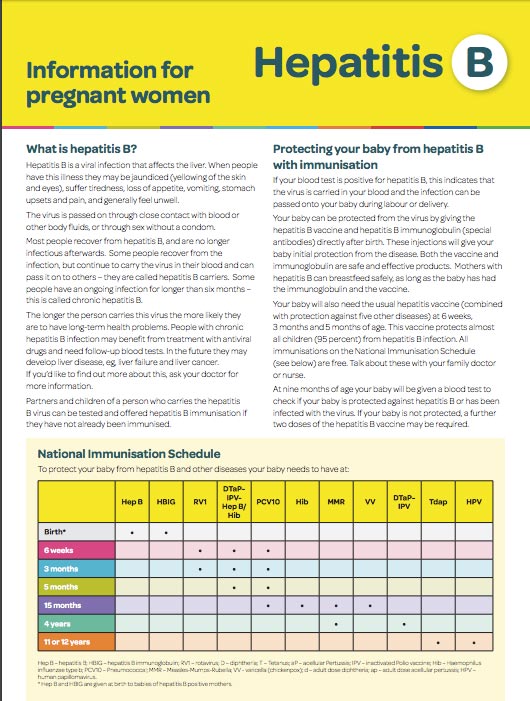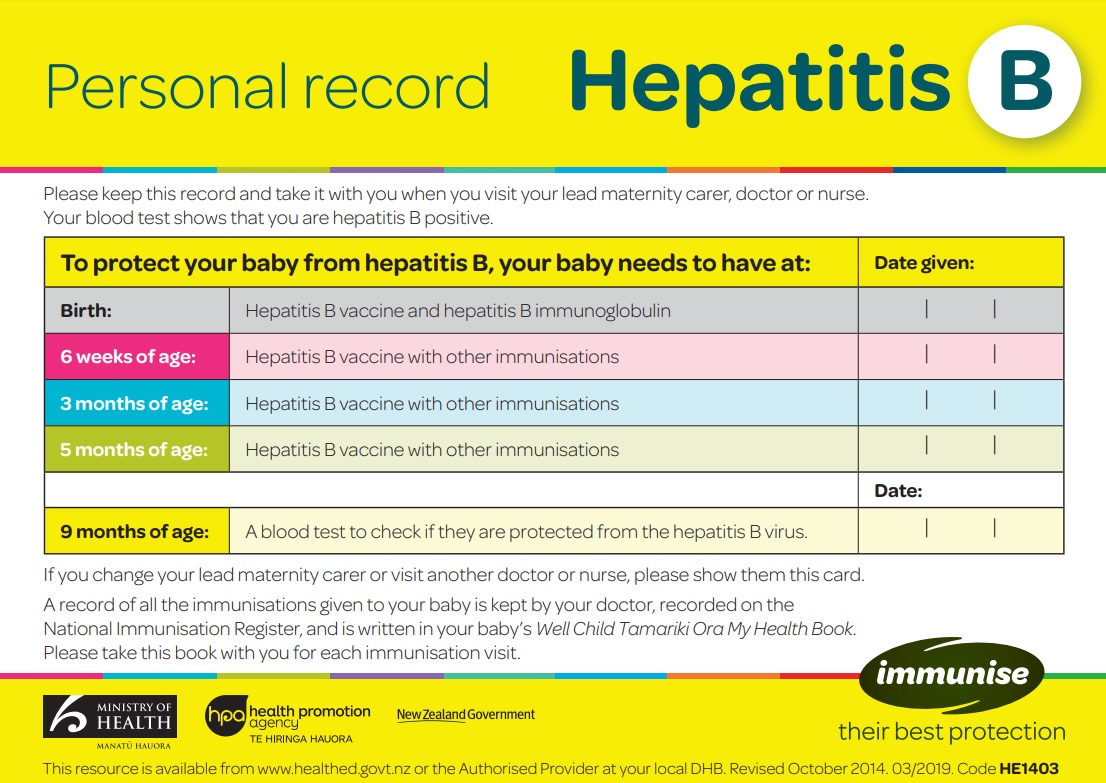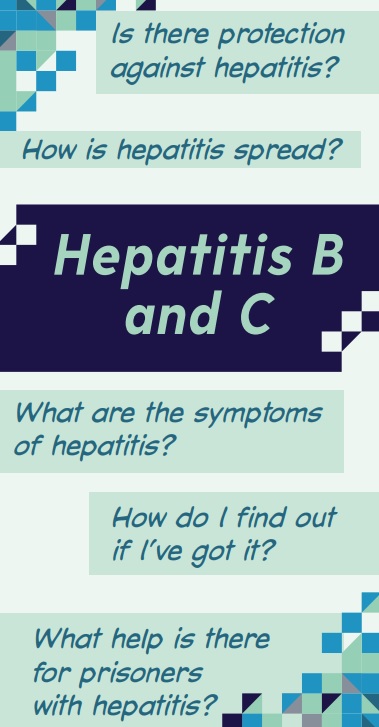Hepatitis B and pregnancy
Key points about hepatitis B and pregnancy
- Hepatitis B (pokenga ate) is a virus that causes inflammation of your liver.
- If you have hepatitis B during pregnancy, you can pass the virus on to your baby during the birth.
- Most people who are carriers of the hepatitis B virus are unaware of this, because often there are no symptoms or only mild symptoms.
- During pregnancy you will be offered a blood test for hepatitis B.
- Medicines can reduce the risk of transmission and protect your baby from hepatitis B.

Hepatitis B (pokenga ate) is a virus that causes inflammation of your liver. If you have hepatitis B during pregnancy, you can pass the virus on to your baby. There are various medicines that can reduce the risk of transmission and protect your baby from hepatitis B.
- Most people who are carriers of the hepatitis B virus are unaware of this, because often there are no symptoms or only mild symptoms. Read more about hepatitis B and chronic hepatitis B.
- You can pass hepatitis B to your baby during the birth through contact with your blood and body fluids. This can happen with vaginal delivery or Caesarean section.
- During pregnancy, as part of your antenatal checks when you first see your lead maternity carer, you will be offered a blood test for hepatitis B.
- Hepatitis B doesn’t usually cause problems for you or your unborn baby during pregnancy. However, when babies and young children get infected (although they don’t tend to get sick) they're at much higher risk of remaining a hepatitis B carrier and developing ongoing liver problems later in life.
- There are various medicines that can reduce the risk of transmission (passing it on) and protect your baby from hepatitis B.

Image credit: Canva
During pregnancy, as part of the antenatal blood test, your hepatitis B status will be checked. If you test positive for hepatitis B, you will be offered a test that checks the level of hepatitis B virus in your blood. The level of hepatitis B is called the viral load. Without treatment, the higher your viral load, the greater the chance of passing the hepatitis B virus to your baby.
- If your viral load is very high, then the risk of transmission of the hepatitis B virus to your baby is significant even when your baby is given hepatitis B immunoglobin and vaccine. Tenofovir can reduce the risk of transmission.
- All babies born to mothers with hepatitis B will be given hepatitis B vaccine and hepatitis B immunoglobulin soon after delivery.
- However, if your viral load is high, you will also be offered treatment with an antiviral medicine called tenofovir to reduce the amount of virus in your body before delivery.
Tenofovir
Tenofovir tablet is an antiviral medicine. Tenofovir stops the hepatitis B virus multiplying, thereby helping to stop the virus crossing the placenta to infect your baby. This tablet is taken for the last 8–12 weeks of pregnancy (the third trimester) and is continued for 4–12 weeks after your baby is born. Tenofovir is safe for you and your baby, and you can breastfeed while taking it. Read more about tenofovir.
Hepatitis B vaccine and hepatitis B immunoglobulin
Soon after delivery, your baby will be given 2 injections – a dose of the hepatitis B vaccine and a dose of hepatitis B immunoglobulin.
- Your baby will also need the usual hepatitis vaccine at 6 weeks, 3 months and 5 months of age. Read more about the hepatitis B vaccine.
- At 9 months of age, your baby will be given a blood test to check whether they are protected against hepatitis B or have been infected with the virus. If your baby is not protected, a further 2 doses of the hepatitis B vaccine may be given.
What are the side effects of the vaccine and immunoglobulin?
Like all medicines, hepatitis B vaccine and hepatitis B immunoglobulin can cause side effects, although not everyone gets them. Some of the possible side effects include a mild reaction to the injection (eg, a rash or a rise in body temperature) and, rarely, a severe reaction to the injection.
Mothers with hepatitis B can breastfeed safely. It’s extremely unlikely that hepatitis B can be passed via breast milk, unless your nipples become cracked and start bleeding. If this happens ask your midwife or healthcare provider for advice.
Pregnancy(external link) Hepatitis Foundation, NZ
Apps
Pregnancy, baby care and parenting apps
Resources
Hepatitis B – Information for pregnant women(external link) HealthEd, NZ, 2023
Hepatitis B and C(external link) HealthEd, NZ, 2013
Hepatitis B – personal record(external link) HealthEd, NZ, 2019
References
- Management of hepatitis B in pregnancy(external link) RANZCOG, NZ, 2016
- Immunise your child(external link) Immunise and Health New Zealand | Te Whatu Ora, 2023
- Hepatitis B – information for pregnant women(external link) HealthEd, NZ, 2023
Brochures

HealthEd, NZ, 2023

HealthEd, NZ, 2020

HealthEd, NZ, 2013
Credits: Healthify editorial team. Healthify is brought to you by Health Navigator Charitable Trust.
Reviewed by: Yini Ye and Rachel Li, Clinical Nurse Specialists, Middlemore Hospital, Auckland
Last reviewed:





